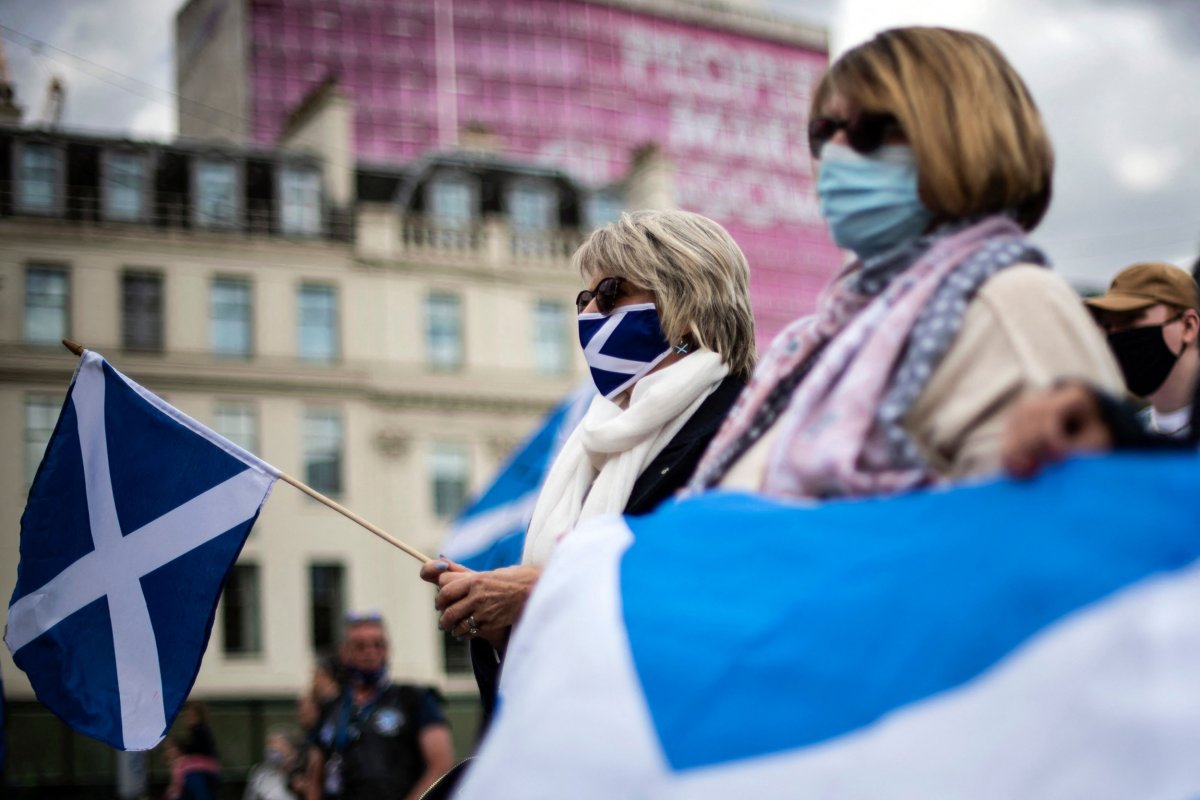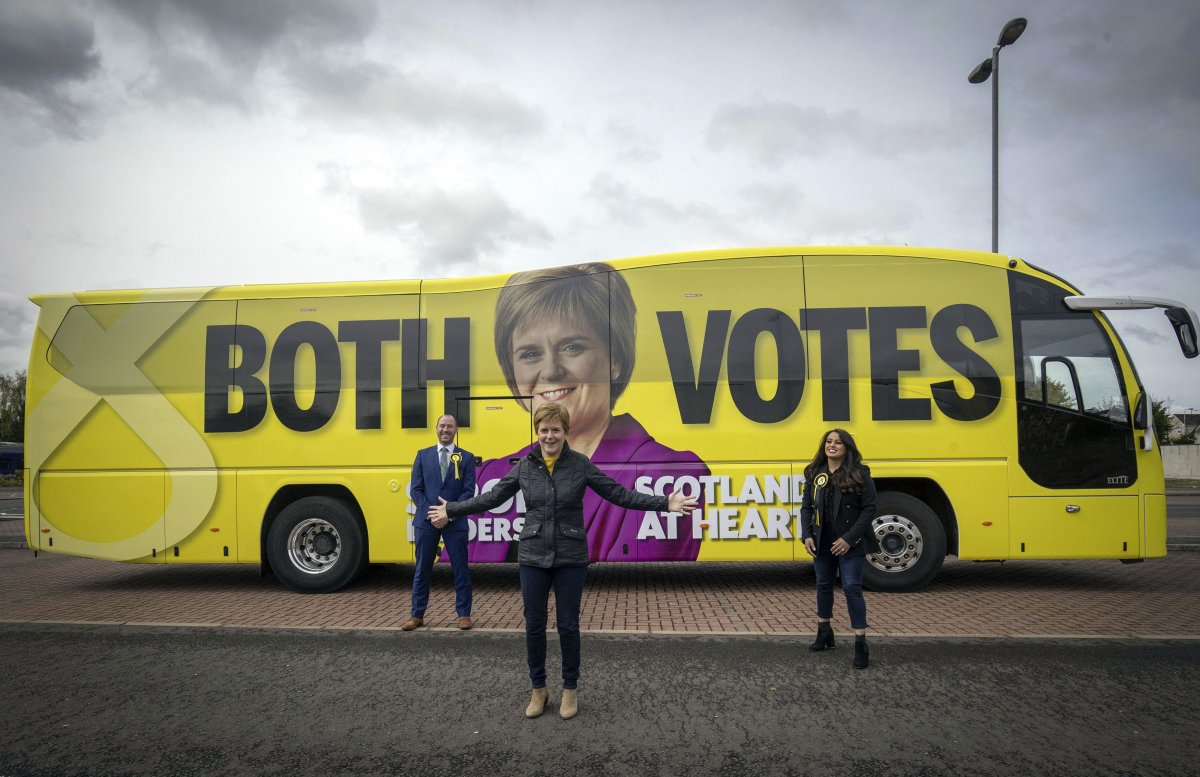The economic upheaval following Britain's exit from the European Union and the coronavirus pandemic has cast a shadow over the push for Scottish independence.
As Scotland heads into parliamentary elections Thursday, the Scottish National Party, which has led a minority government since 2016, says a big victory will give it the political momentum to hold a referendum on whether Scotland should end its union with England.
Scotland voted to remain in the U.K. in a 2014 independence referendum, but Scottish National Party (SNP) leader Nicola Sturgeon says that Brexit changed the situation. While the U.K. as a whole voted narrowly in 2016 to leave the bloc, a majority of Scottish voters wanted to remain in the EU.
However, the thousands of jobs and lives lost due to the coronavirus, along with the economic impact of Brexit on Scotland, have many Scots feeling cautious about another major political event.
Mark Diffley, a political pollster in Edinburgh, said that "there is very little support, including amongst independence supporters," for a referendum soon.
"The economic prospectus for independence is now not really worth the paper it's written on, because COVID has just put an earthquake in the middle of any economic forecasts," he said. "It will suit everyone, I think, to let this settle—let the dust settle on the election, let the focus be on the economic and social recovery from the pandemic and address the independence question a bit later."

For more reporting from the Associated Press, see below:
Sturgeon, the first minister of Scotland, says that if she wins a majority on Thursday, she will pass legislation through the Scottish Parliament for a new independence referendum, forcing British Prime Minister Boris Johnson to challenge the law in court if he wants to stop it.
Elections are also being held Thursday for the Welsh Assembly, London mayor and local authorities across England, in the biggest test of Britain's political temperature since Johnson's Conservatives won a general election in 2019.
Polls suggest it's almost certain the SNP will win the most seats in Scotland's semi-autonomous parliament, but may not secure an overall majority.
For some voters, the issue of independence has been supplanted by more urgent concerns—not least COVID-19, which has cost thousands of jobs and caused more than 7,600 deaths in this country of 5.5 million people.
Brexit has also prompted some to reconsider. Fractious, years-long divorce negotiations between the U.K. and the much larger EU proved harder than British Brexit-backers had promised—a foretaste of how a future U.K.-Scotland split could unfold. New post-Brexit barriers to trade with Europe have hammered Scottish business including fish and seafood exporters, who say checks and red tape have left Europe-bound catches rotting in trucks.
James Cook was an enthusiastic supporter of Scottish independence, but now he's not so sure because "a third major event could be cataclysmic for us."
"Businesses are really on the back foot at the moment," said Cook, who runs seafood seller D.R. Collin & Son in the port of Eyemouth, near the Scottish-English border. "So I think if you speak to anybody that is business-orientated, they will be a bit cautious."
Cook said he still supports independence in the long term, but there are "a lot of issues we need clarity on" first.
Sturgeon has downplayed independence in her campaign, stressing her credentials as a safe pair of hands to lead Scotland's recovery from the pandemic.
"I am the only candidate for first minister offering tried and tested leadership to guide us through the crisis and into recovery," Sturgeon said in an open letter to Scottish voters, which didn't mention independence.
Sturgeon, who has led Scotland since 2014, has seen her reputation enhanced by her response to COVID-19. Her calm, crisp style contrasts with the erratic messaging and frequent policy shifts of Johnson, whose brand of posh, polysyllabic Englishness grates on many Scots.
Her popularity has left Scotland's two big pro-Union parties, the Conservatives and Labour, fighting over second place. Both parties have seen their poll ratings plunge in recent years. But both are hoping for a comeback under new leaders, Anas Sarwar for Labour and Douglas Ross for the Conservatives.
On Sturgeon's other flank is the uncompromisingly pro-independence former SNP leader Alex Salmond. He and Sturgeon are former friends and political allies who fell out over misconduct allegations against Salmond, who was tried and acquitted last year on sexual assault charges.
Salmond says the allegations were part of a witch-hunt by his political opponents, and attacked the Scottish government, and Sturgeon, over how they were handled.
In March, Salmond announced he was forming a new pro-independence party, Alba—the Scottish Gaelic word for Scotland. Alba is not running against the SNP in Scotland's 73 parliamentary constituencies but is fielding candidates in the regional contest used to elect the other 56 lawmakers. Salmond says Alba seats will help form a pro-independence "super majority" in the Scottish Parliament.
Salmond is a huge figure in Scottish politics who as first minister secured the first independence referendum in 2014. But his attempts to stay in the limelight — which include hosting a talk show on the Kremlin-funded TV channel RT—and the sex abuse allegations have tarnished him.
Polls suggest voters have limited appetite for Alba's chest-thumping style of Scottish nationalism and are more in tune with Sturgeon's take-it-slowly approach.
"I completely understand the emotional pull of independence," said undecided voter Olive Burnside, a retired English teacher in Glasgow. "And also I would love to be free of the bunch of idiots—well, corrupt people—that we have in [the U.K. government in] Westminster at the moment.
"So my heart says, 'Oh yes it would be great.' But my head just does wonder about the economic side of things, about managing such a small country."

Uncommon Knowledge
Newsweek is committed to challenging conventional wisdom and finding connections in the search for common ground.
Newsweek is committed to challenging conventional wisdom and finding connections in the search for common ground.
About the writer
Lauren Giella is a Newsweek National reporter based in New York. Her focus is reporting on breaking and trending U.S. ... Read more
To read how Newsweek uses AI as a newsroom tool, Click here.








